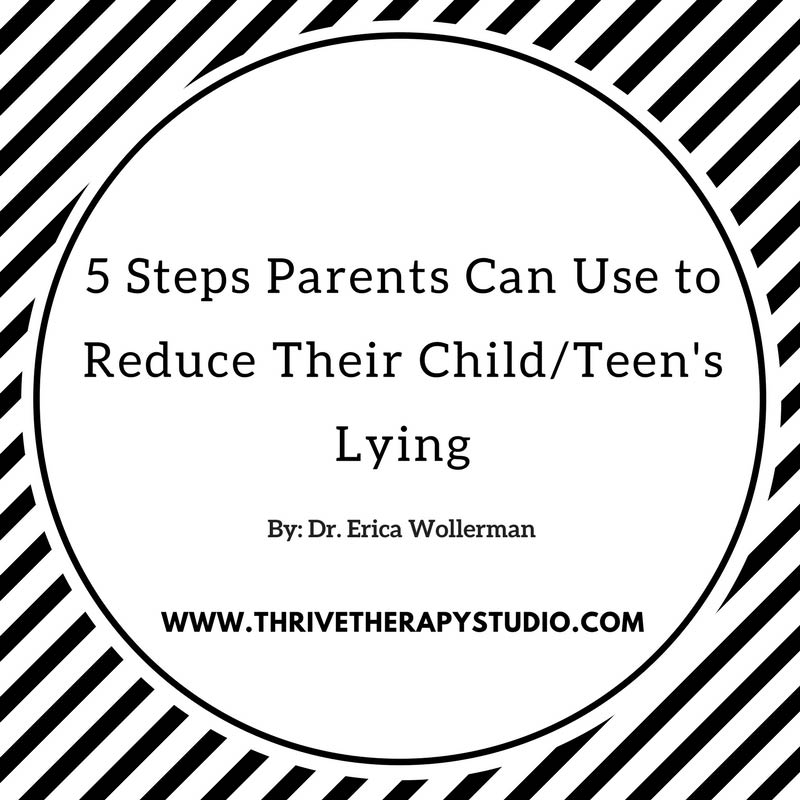5 Steps Parents Can Use to Reduce Their Child/Teen’s Lying

At Thrive Therapy Studio, we work with children and teens of all ages and often their parents are very concerned about one behavior in particular, lying. This is one topic that seems to come up over and over again regardless of the reason why we are seeing a child/teen in therapy. Parents ask all kinds of questions… Why does my child lie? How can I make them stop lying and tell the truth? I’m so frustrated, what do I do? What’s wrong with them? Are they a pathological liar?
Interestingly, lying in small doses is actually not a behavior that concerns me as a therapist. It shows a child or teen’s resourcefulness as well as their growing autonomy from their parents, which are all developmentally normal and generally considered good things. When we see a lot of lying, however, it is concerning to us as well as parents.
When parents talk to us about lying, it is often a conversation about what is wrong with their child or teen… Not so much about what they could be doing differently. Interestingly though, I am often going to focus more on the parent’s behavior than the child or teen initially. First, I want to explore with the parent how their behavior may contribute to their child/teen’s lying behavior. Often, children and teens talk to me about being afraid to tell their parents the truth about things, even small mistakes that they make, because they have learned that their parents get really angry, yell, punish them, and generally “can’t handle the truth.”
Unfortunately, while understandable, these parent responses make children and teens feel unsafe around their parents and make them feel that they can’t really tell them things, particularly not hard things or mistakes they have made. For children sensitive to failure and who already struggle to admit their mistakes, this compounds the challenge of truth telling exponentially.
This brings me to the main way parents can prevent and reduce lying. Parents can prevent and reduce lying by responding to their child calmly and with an interest in finding solutions, rather than immediately jumping to blame, shame, and consequences for the child. For example, if you find out that your child did not do well on a math test, you felt they were well prepared for, rather than being angry and asking them “what they did wrong or how could this happen,” you can say something like, “I am so sorry to hear that test did not go the way you were hoping. It must have been hard to talk to me about it but I am so glad you did. What do you think might be helpful in the future or do you think there is anything you can do to improve this grade now?” If you respond in this way, your child is much less likely to hide grades in the future and to talk to you about how things are going academically.
This does not mean that consequences should not be given. At times, consequences are perfectly appropriate, they just should not be given in a hasty way out of anger or shame, but perhaps in a conversation with your child or teen. You can even ask them what they think would be appropriate as a consequence for the mistake or situation that came up. For example, if your child accidentally broke something in your home, the conversation might go something like this… “Thank you so much for telling me what happened, I can tell that was difficult. I’m disappointed that the window is broken but I do know that mistakes happen to all of us. What do you think you could do to prevent accidents like this in the future? What do you think would be a fair consequence?” Hopefully your child/teen would come up with something along the lines of being more careful to prevent this accident from happening again and then you could arrange for a way for them to help pay for the broken window. This makes the most sense as it is a natural consequence that results from cause and effect, something is broken and we pay to fix it.
Here are the basic steps for responding to difficult moments with your child or teen using the above example:
- Connect and respond with empathy – Thank you so much for telling me what happened, I can tell that was difficult for you
- Express some degree of your feelings calmly
- Validate that mistakes happen and are not the end of the world – #2 and #3 are combined in this example – “I’m disappointed that the window is broken but I do know that mistakes happen to all of us.”
- Come up with ways to work on this in the future – What do you think you could do to prevent accidents like this in the future?
- Discuss consequences if calm and if appropriate for situation – What do you think would be a fair consequence?
Through these steps and a lot of patience, you can definitely help your child or teen respond to you in a different way and create a culture of honesty in your family!
If you would like to talk with a Thrive Therapist about yourself, your child, or teen attending therapy, please reach out to us by phone at (858) 342-1304.
As always, thanks for reading and comments are always welcome regarding any issues around child or teen psychotherapy services in San Diego by Thrive Therapy Studio.
To stay in the loop on the services offered and to receive updated information about Thrive, please feel free to sign up for the newsletter through the following link: http://eepurl.com/cvGx5n.
Reach out to start
your healing journey

